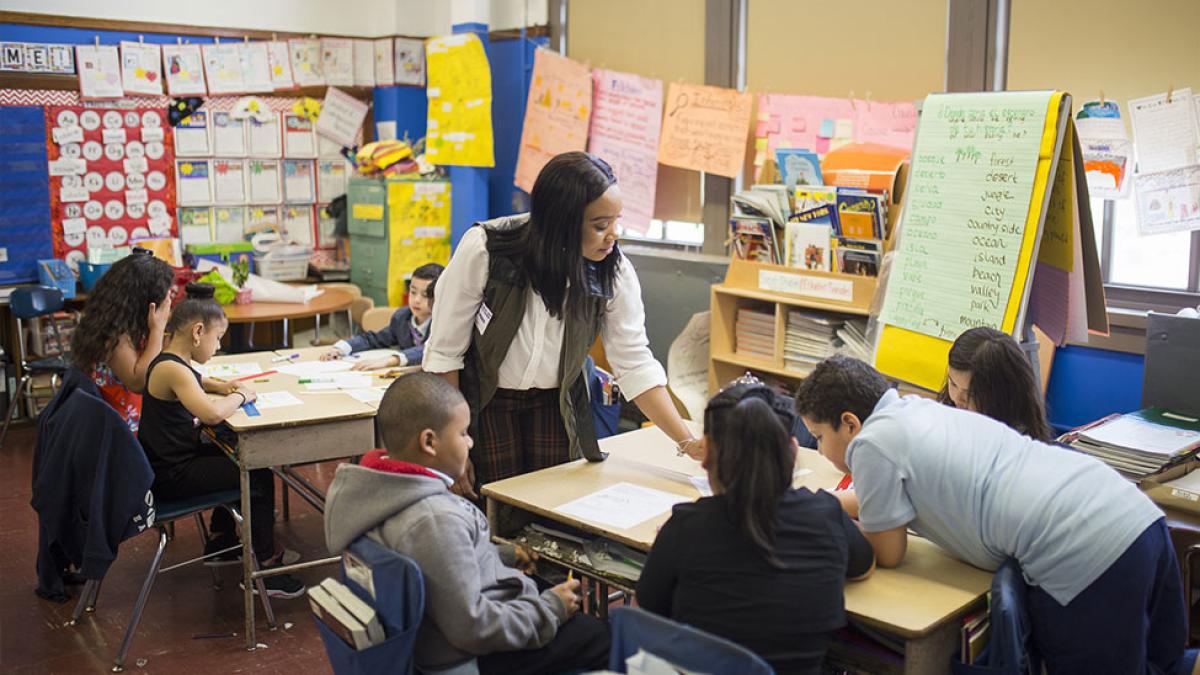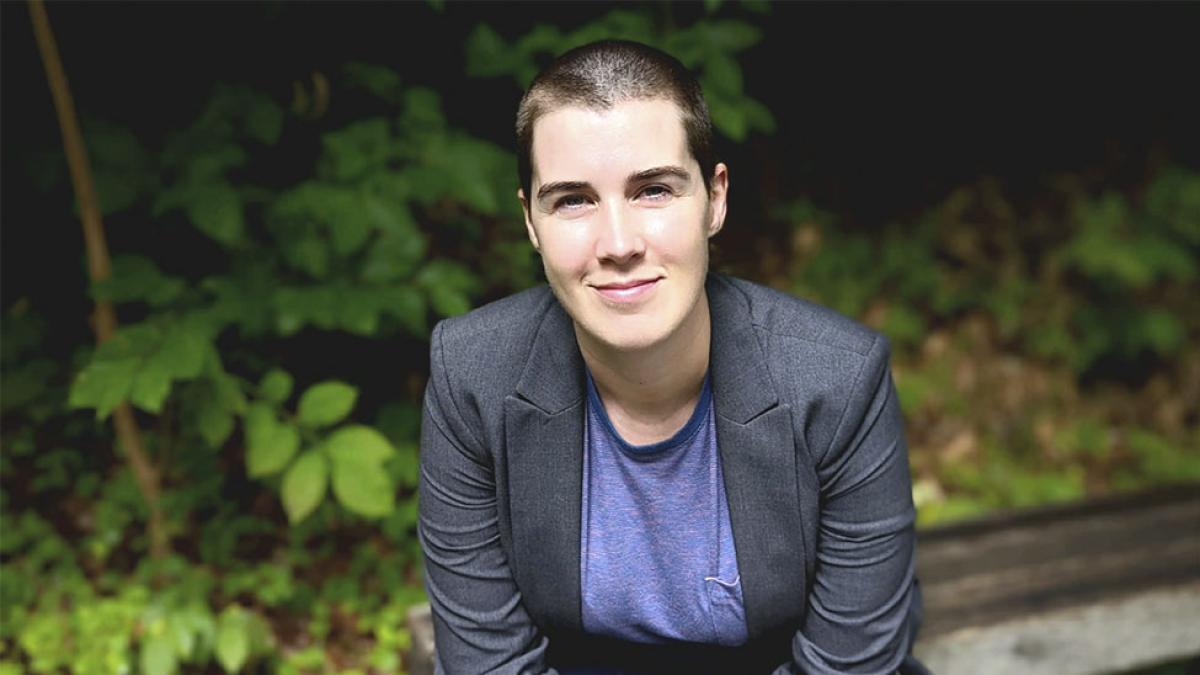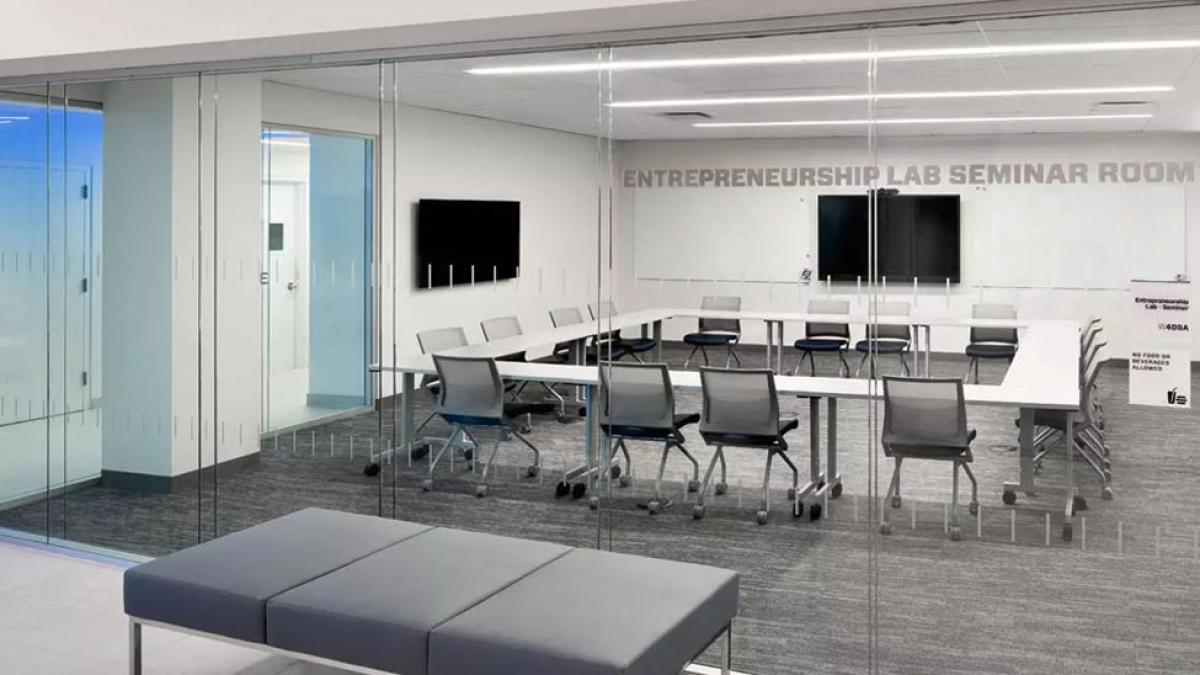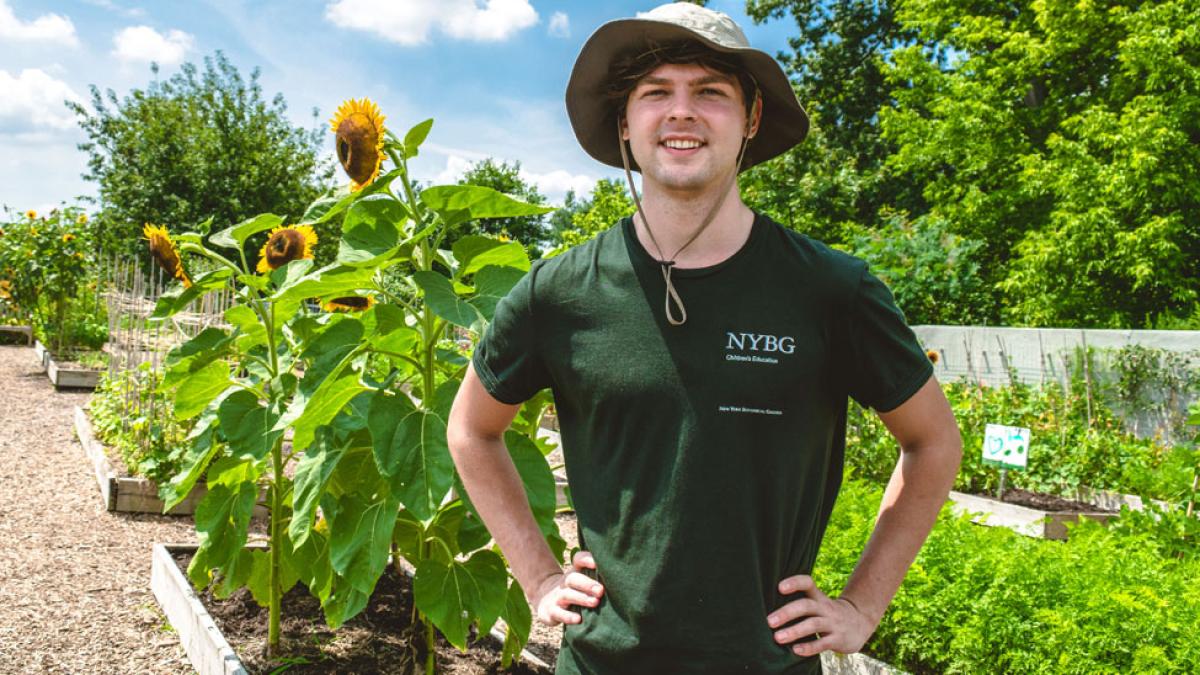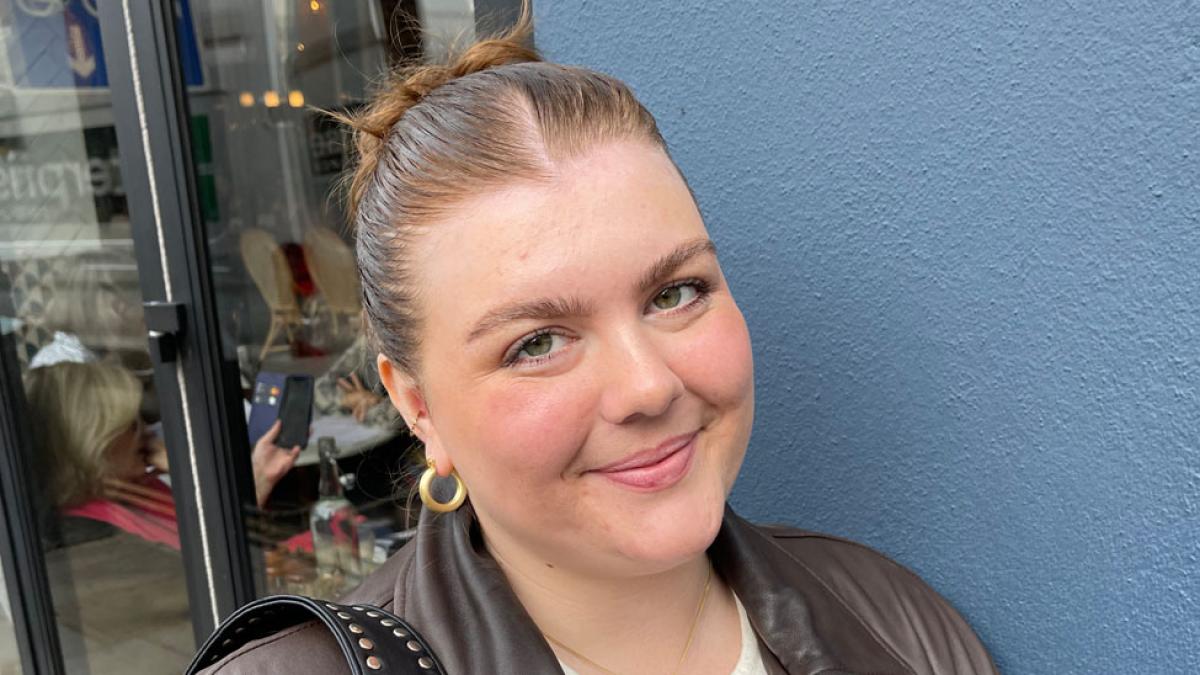Through interdisciplinary collaboration, the School of Education and Dyson's Film and Screen Studies departments are helping a major school district in Florida tackle the challenges of today’s teacher shortage head-on.
Unlocking Students' Cyber Potential
Pace’s continued success in the National Cyber League, an intercollegiate competition testing students’ cybersecurity mettle, demonstrates one of the many ways Seidenberg continues to stand out as a leader in cybersecurity.
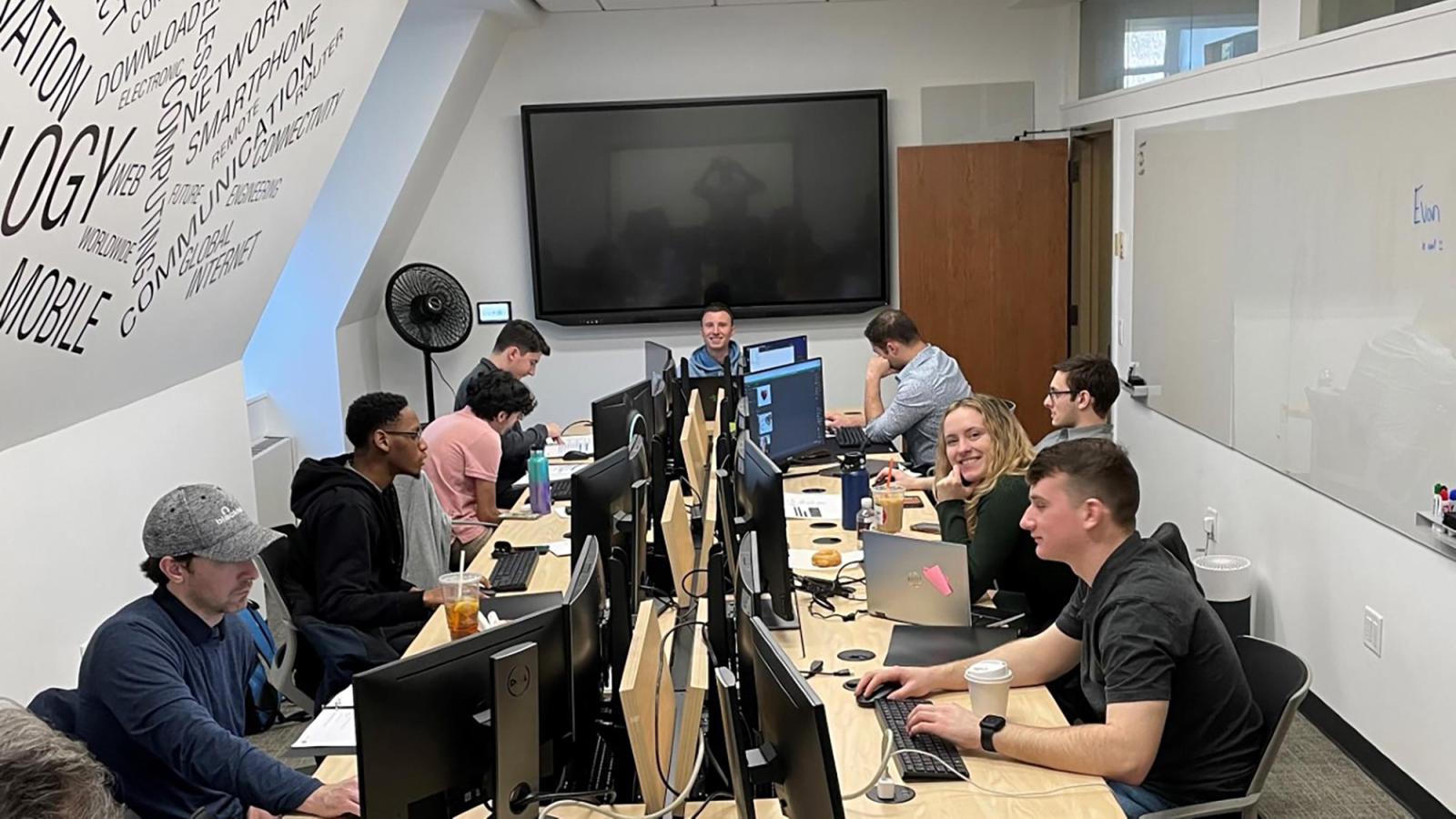
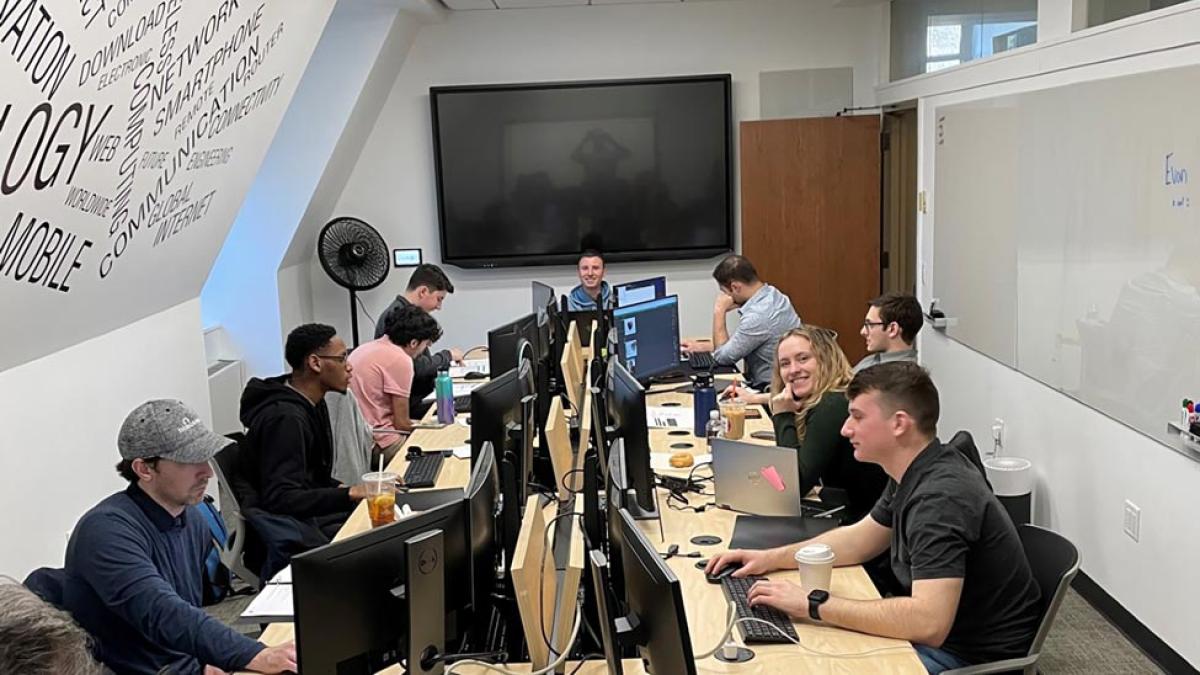
Over the past several years, Pace’s Seidenberg School of Computer Science and Information Systems has established itself as a national leader in cybersecurity education. You don’t need to just take our word for it; the United States Department of Homeland Security (DHS) and National Security Agency (NSA) also agree, having designated Pace a National Center of Academic Excellence in Cyber Defense Education (CAE-CDE). Furthermore, the National Science Foundation and the United States Department of Defense have collectively awarded Pace millions of dollars in grants and scholarships to further develop Pace’s top talent.
So again, not to brag—when it comes to cybersecurity, we’re kind of a big deal.
What’s the secret to all of this success? It of course starts with the wonderful infrastructure at Seidenberg, from state-of-the-art labs to the accomplished and dedicated faculty. Yet, it is our students—always on the lookout to further improve and develop their skills—who truly enable Seidenberg to stand out.
One example of Seidenberg’s culture of continued excellence is its participation—and continued success—in the National Cyber League (NCL). The league consists of a biannual intercollegiate competition that tests students’ cybersecurity skills through a series of challenges. Unsurprisingly, Pace has consistently outperformed the competition. In Fall 2021, the one of the participating Pace teams placed 7 out of 920 teams; and in Fall 2022, Pace placed 27 nationally among over 7,500 students from 470 colleges and universities.
Furthermore, several Seidenberg students, including computer science major Andrew Iadevaia ’23, placed in the 99th percentile, outperforming nearly all of the other 6,675 students who participated.
“Coming to Pace, I knew very little cybersecurity-wise,” said Andrew. “I went to the first town hall meeting, fall of freshman year, I met Kyle Hanson—who had just recently graduated—and he encouraged me to join NCL. From there I got hooked on it. I went from wanting to be a software engineer writing code, to ‘I want to solve challenges and be challenged.’”
“Even though it’s a competition, it’s a big support group where everyone is really just helping each other out
Andrew’s enthusiasm regarding the competition is echoed by fellow NCL Pace team members. Nora Broyles ’24, a double major in computer science and mathematics with a minor in IT, was a new Pace transfer student when she heard about the competition through her scholarship and joined the team.
“I had heard about the competition, but didn’t join until I transferred to Pace,” said Nora. “It was definitely a positive experience.”
Another competitor, Joseph Paradiso ’24 was also encouraged by older students to enter the NCL after joining the cybersecurity club.
“I didn’t know much coming into it, and I’ve learned a lot. The club guides you in terms of starting out,” said Joseph. “I always had an interest in cybersecurity but doing the league has definitely put me more on the cybersecurity track.”
Each NCL competition, held once in the fall and once in the spring, consists of both individual and team elements. The individual element, which takes place in a 48-hour window over a single weekend, calls upon students to solve as many challenges as possible, and participants can track their progress via a virtual leaderboard. While the team members enjoyed the individual component—and find that it truly tests your abilities and skills under pressure—it is the Pace team component, held over the following weekend, that they find to be the most rewarding.
“The team component is my favorite part—that Saturday, we typically book a room in Seidenberg and the NYC Campus will come to Pleasantville for the day, we’ll stay there working and people bring donuts and pizza,” says Andrew. “It’s a lot of fun, we joke around but we also get to learn new things from each other.”
“Something that surprised me was how supportive everyone is,” added Joseph. “Even though it’s a competition, it’s a big support group where everyone is really just helping each other out.”
The Pace team—which consisted of seventeen students—was led by faculty coach Andreea Cotoranu, who ensures everything regarding the competition runs smoothly in order to put students in the best position to succeed.
“My role as the coach is to connect students with opportunities in the field, and further to promote the students,” notes Cotoranu. “at the cybersecurity program level, we wanted to empower students to advance in the NCL competition, and those students teach the newer students. We want to turn training into a student-driven event.”
As an educator, Cotoranu finds the NCL and related extracurriculars an essential component of a cybersecurity education. While classroom learning is of course vital, students who go the extra mile and take advantage of the many opportunities Seidenberg offers outside of the classroom are able to maximize both their learning and their potential.
“Competitions such as NCL are also important for us as educators. They provide a context for students to practice with their skills in exercises that are fun and collaborative. The structure and motivation the competition offers is very helpful for students; and it’s especially a great opportunity to connect other like-minded students,” notes Cotoranu. “Additionally, it gives students a way to demonstrate their technical skills and to speak to employers about what they do, and how they learn.”
Nora, whose specialization is on the math side, echoed that the competition is a great way to develop a more well-rounded skill set, which can be invaluable when looking to build technical and professional expertise—and stand out amidst a pile of resumes.
“It helps to diversify your skill set because it’s such a broad competition,” says Nora. “It shows willingness to learn outside of your respective discipline.”
All in all, Pace’s success in the National Cyber League is a testament to Seidenberg’s commitment to providing students with top notch experiential learning opportunities; and empowering our talented students do the rest.
“I came here not knowing a single thing about cybersecurity,” says Andrew. “I was able to build my skills up. Any extracurricular activities like this, I recommend doing. They’ll expand on things that aren’t taught in the classroom that could be very beneficial.”
Connect with the Cybersecurity Club
To learn more or get involved with the team, connect with the Cybersecurity Club on Discord (BergCyberSec server, visit our Instagram page @bergcybersec, or reach out to Professor Joe Acampora.
For information about Pace's cybersecurity programs and scholarship opportunities, visit the Cybersecurity Education and Research Lab.
More from Pace
Director of Communications and Strategic Operations at Seidenberg; executive and life coach for LGBTQ+ leaders; INvolve 2022 OUTstanding LGBT+ Future Leader; and NASA diversity, equity, and inclusion panelist. Katie Todd has been busy ever since they left Scotland and came to Pace and they show no signs of stopping. Get to know this Pace powerhouse.
The Pace Entrepreneurship Studio supports new startups, from ideation to funding—from conception to operation. Our mission is to teach you the "how" and to support the "what"—providing students and alumni with a complete blueprint for establishing successful businesses.
International Anticorruption Prosecutor Veronica Dragalin of Moldova to Receive the Distinguished Robert S. Tucker Prize for Prosecutorial Excellence
The Elisabeth Haub School of Law at Pace University will bestow the 2023 Robert S. Tucker Prize for Prosecutorial Excellence on Veronica Dragalin, Chief of the Anticorruption Prosecution Office for the Republic of Moldova, in recognition of her outstanding contributions to the field of criminal prosecution and excellence in prosecutorial practice.
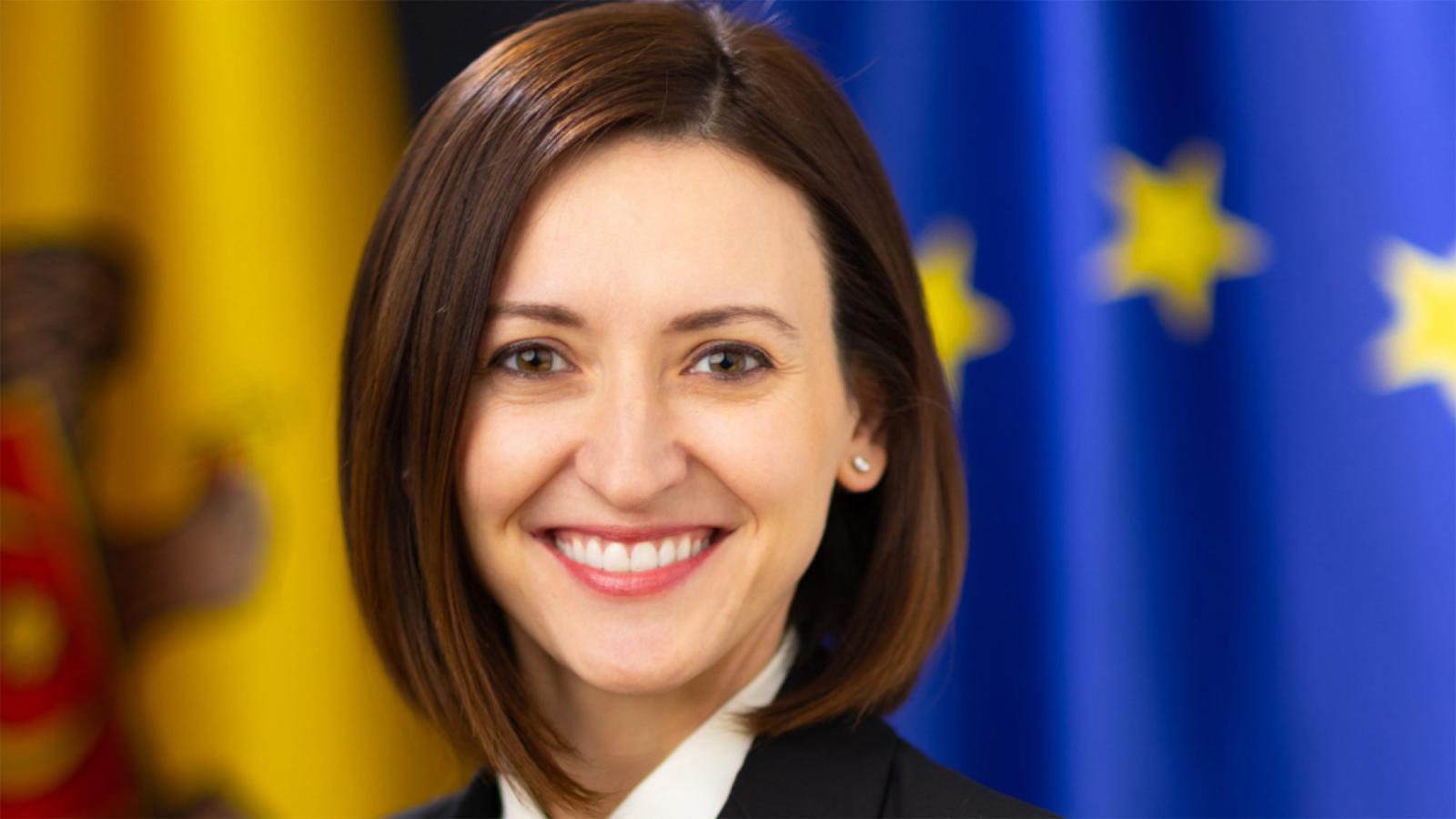
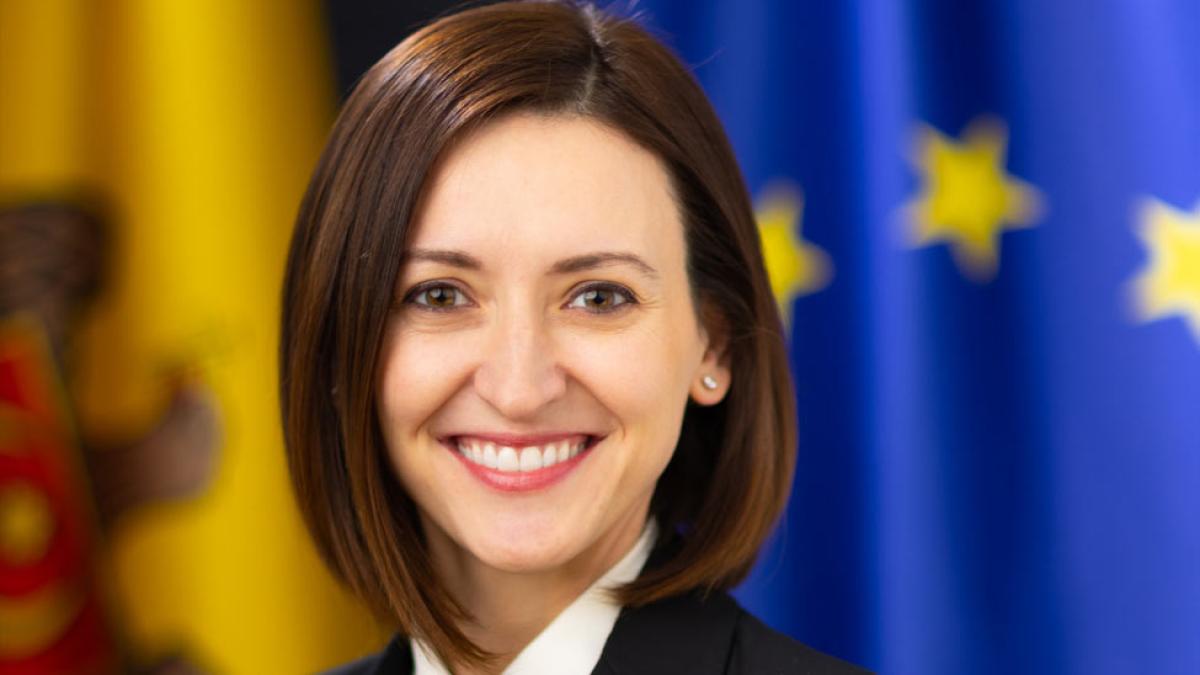
The Elisabeth Haub School of Law at Pace University will bestow the 2023 Robert S. Tucker Prize for Prosecutorial Excellence on Veronica Dragalin, Chief of the Anticorruption Prosecution Office for the Republic of Moldova, in recognition of her outstanding contributions to the field of criminal prosecution and excellence in prosecutorial practice.
“Veronica has led an impressive career demonstrating her commitment to the pursuit of justice both as an accomplished Assistant United States Attorney and now in a challenging, and historic, role as head of Anticorruption for Moldova,” said Dean Horace E. Anderson Jr. “She took on this role at a particularly volatile time in the region and made history as the first-ever female in the position. Her tenacity to leave a successful position in the US to lead the fight against corruption in her native country is truly admirable.”
Veronica Dragalin is a dual citizen born and raised in the Republic of Moldova and educated in the United States. She received an undergraduate degree from Duke University and a JD degree from the University of Virginia School of Law. She spent the first years of her career as an associate at the international law firm, Jones Day. After working as a lawyer on civil litigation and international criminal investigations, in 2016, Veronica became a federal prosecutor in Los Angeles where she worked in the Public Corruption & Civil Rights Section and served as the office’s Hate Crimes Coordinator. Veronica tried ten jury trials as a prosecutor and charged more than 50 cases, including against federal and local law enforcement officers for civil rights violations as well as public officials for bribery and other corruption crimes, including a RICO conspiracy case charging Los Angeles City Councilmembers, a Deputy Mayor, and other public officials and individuals involved in a pay-to-play scheme.
On August 1, 2022, Veronica began her current mandate as the Chief of the Anticorruption Prosecution Office for the Republic of Moldova, taking on the challenging role for a country with a long history of systemic political corruption at an especially turbulent time in the region. Her office of approximately 130 personnel currently handles criminal corruption investigations and prosecutions against high-level officials, including the ex-President, the suspended Prosecutor General, members of parliament, judges, and prosecutors.
Veronica is already making an impact in her new role within a short time. According to Transparency International’s 2022 Corruption Perceptions Index (CPI) published in January 2023, Moldova’s score has increased by three points, one of the most significant improvements made, placing it at 91 out of 180 countries in the CPI. The CPI ranks countries annually “by their perceived levels of public sector corruption, as determined by expert assessments and opinion surveys.”
“Veronica Dragalin’s remarkable career is a reflection of the values and commitment in criminal prosecution that we aim to recognize with this award,” said Robert S. Tucker, Chairman and CEO of T&M, whose generous gift has endowed this annual award at Haub Law. “Prosecuting rogue public officials and fighting corruption crimes in the US and abroad is difficult and often dangerous work, but Veronica has demonstrated her resolve and drive to lead reform here and around the world. We are delighted l to present her with the Robert S. Tucker Prize for prosecutorial excellence and to celebrate her accomplishments among her peers and the global law community.”
The Robert S. Tucker Prize for Prosecutorial Excellence is awarded annually to an individual or a group of individuals who have made outstanding contributions to the field of criminal prosecution and who demonstrate excellence in prosecutorial practice. Honorees are selected each year by a jury comprised of former prosecutors and faculty members from the Elisabeth Haub School of Law at Pace University. The award ceremony brings together prosecutors from across the region and state, civic leaders, members of the judiciary, New York City government and the Haub Law community to recognize these distinguished individuals for their work. The prize is made possible by the generous support of Haub Law alumnus and Pace University Board of Trustees member Robert S. Tucker. Past Award Recipients include Bronx District Attorney Darcel D. Clark and the Office of the Bronx District Attorney, Brooklyn District Attorney Eric Gonzalez, former New York Attorney General Barbara Underwood, and Richard A. Brown, the late Queens District Attorney.
The ceremony for the Robert S. Tucker Prize for Prosecutorial Excellence will be held on Wednesday, March 22 at 6:00 p.m. at Pace University in Manhattan, NY. For additional information on the ceremony, please contact Rachael Silva.
Tyre Nichols's Death and the Cycle of Police Violence
Haub Law Professor Randolph McLaughlin provides insights and perspectives about police culture and the killing of Tyre Nichols.
Yes, A Supreme Court Justice's Spouse Makes A Ton From Biglaw Firms. No, This Is Not Actually A Big Deal.
An ethics opinion by Bennett L. Gershman, a Pace University law professor and former Manhattan prosecutor, accompanied the letter and said “it is plausible that the Chief Justice’s spouse may have leveraged the ‘prestige of the judicial office’” to “raise their household income.” He added that those concerns, coupled with what he described as the chief justice’s lack of disclosure of potential conflicts, “threaten the public’s trust in the federal judiciary, and the Supreme Court itself.”
‘They come to me’: Jane Roberts’ Legal Recruiting Work Involved Officials Whose Agencies had Cases Before the Supreme Court
In an analysis filed along with the complaint, Pace University law professor Bennett Gershman writes that “it is plausible that the Chief Justice’s spouse may have leveraged the ‘prestige of judicial office’ to meaningfully raise their household income.” “That concern, together with the failure of the Chief Justice to recuse himself in cases where his spouse received compensation from law firms arguing cases before the Court, or at least advise the parties of his spouse’s financial arrangements with law firms arguing before the Court, threaten the public’s trust in the federal judiciary, and the Supreme Court itself,” Gershman wrote.
Pace University’s law school debuts Legal Hand Call-in Center
Westfair reports that Haub Law has teamed up with Legal Hand to launch Westchester’s first call-in center to offer community members free assistance in the areas of housing, immigration, family issues, public benefits, domestic violence, elderly assistance and estate issues.

The Mecca of New York Skateboarding, Back From the Dead?
Pace University student Jonathan Becker, a skateboarder, is quoted in a New York Times story about a movement to revitalize and reopen Brooklyn Banks under the Brooklyn Bridge.
Jonathan Becker, 22, a student at Pace University who used to look over the Brooklyn Banks from his freshman dorm room, was not ready to give up. “We just hoped that it could lead somewhere, but we didn’t know that it would take off,” Mr. Becker said. “It’s one of those spots within the skateboarding community that really has a lot of deep-rooted history.”
‘Systemic crisis’: Tyre Nichols beating fuels calls for broad police reforms
Haub Law Professor Randolph McLaughlin provides insights and perspectives about police culture and the killing of Tyre Nichols.
"What's most shocking about it all is the brutality and then at the end, the complete dehumanization of this man. He's not even human to them -- he's not even a person," Randolph McLaughlin, professor at the Elisabeth Haub School of Law and co-chair of the Newman Ferrara civil rights practice, told The Guardian.
At the Supreme Court, Ethics Questions Over a Spouse’s Business Ties
Haub Law Professor Bennett Gershman pens an op-ed in The New York Times about potential conflicts of a Supreme Court Justice’s spouse.
An ethics opinion by Bennett L. Gershman, a Pace University law professor and former Manhattan prosecutor, accompanied the letter and said “it is plausible that the Chief Justice’s spouse may have leveraged the ‘prestige of the judicial office’” to “raise their household income.” He added that those concerns, coupled with what he described as the chief justice’s lack of disclosure of potential conflicts, “threaten the public’s trust in the federal judiciary, and the Supreme Court itself.”
Ready to Launch: A New Pace Portal
Launching officially on May 16, get ready to experience a new Pace Portal with upgraded sections, easy-to-navigate structures, and an overall improved user experience. Try the beta now!

Earlier this semester, Pace’s ITS team launched a beta version of a brand-new Pace Portal, which means you’ll get to choose between the old version (the current one you’re used to) and the new version (which we will transition to on May 16, 2023).
Here are a few of our favorite new features and things to look forward to this spring:
- It has a search bar! Looking for that link you found one time three years ago? No need to dig through every page. With the implementation of a search bar, you can easily find the information and resources you need to access.
- Students can see their classes listed right there on top of their personal profile page. When students log in to the new Pace Portal, they’ll be able to see their current class roster right up front and center—you know, the important stuff.
- It’s a soft launch. Hate change? We get it. Our soft launch of the new Pace Portal will happen in beta this January, meaning you can switch back and forth between the old version and the new version while you’re getting familiarized with the new system. With any luck, this will help ease you into a big change.
- You’ll help shape the Pace Portal. While the Pace Community gets used to using the new Pace Portal in beta, we’re hoping to crowdsource feedback from you—our main users! By sharing your feedback with ITS during the Spring 2023 semester, we’ll make tweaks and improvements before the official launch on May 16, 2023.
- You won’t ever have to hunt for your U number ever again. The new Pace Portal displays your personal information on your personalized landing page—your U number, your landline phone number, and your Pace email and username.
Ready to try the new portal?
Have questions or comments on the new Pace Portal? Reach out to Director of Web and Mobile Services Gabriel Terrizzi at gterrizzi@pace.edu.
More from Pace
Across the country, nearly 40 percent of college students report going hungry, and 52 percent have utilized food pantry services at some point. At Pace, we’re working hard to help offset food insecurity on our campuses and we need your help to do it!
Pace gets internships. At the New York Botanical Garden, Thomas Costella is exploring food justice through the Edible Academy and how the power of community can support food systems in New York City and beyond.
As an International Management student, Caroline Dowers '23 is taking what she's learning in the classroom and putting it to work. Not only is she exploring different countries and cultures, but she's also getting true global business experience that will set her apart from other candidates as she searches for a post-graduation job.
